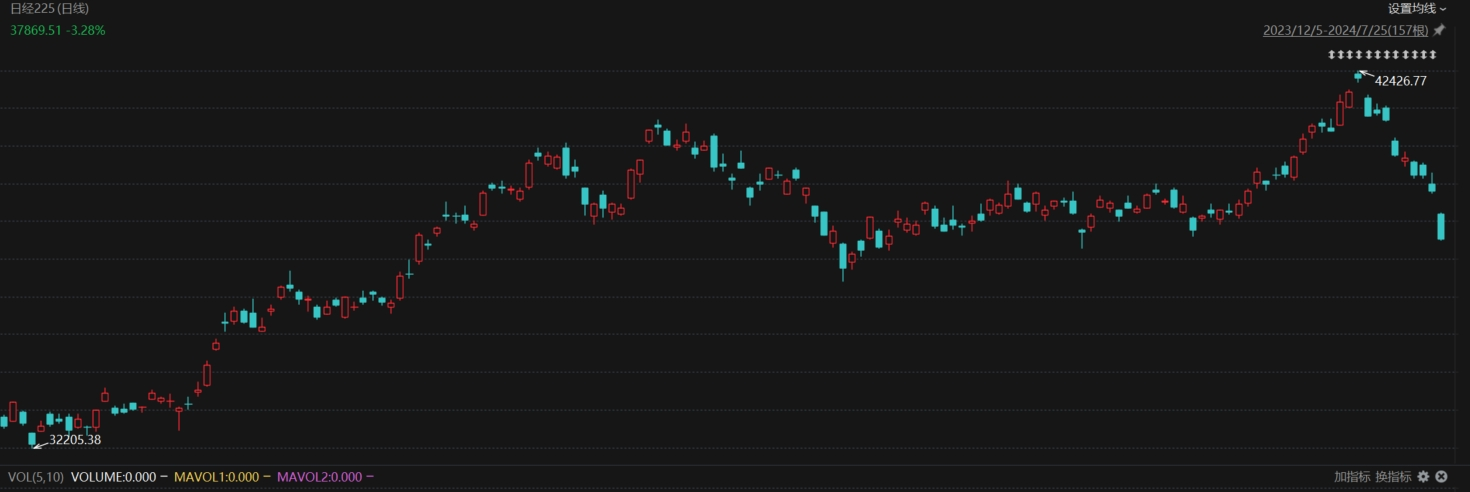Nikkei 225 hit biggest drop in three years as US tech stocks sell off
Of the 33 industry segments on the Tokyo Stock Exchange, only four rose and the rest all fell.
On July 25th, influenced by the previous night's sharp sell-off in US technology stocks and concerns over the central bank's interest rate hike, the Nikkei 225 index entered a technical correction.

On Thursday, the Nikkei 225 index plummeted by 3.28%, closing at 37,869.51 points, marking the largest drop since June 2021, with the index falling approximately 10% from the all-time high it reached just two weeks prior.
Large-cap technology stocks underperformed, with SoftBank Group declining by 7.61%, contributing the most to the Nikkei index's decline; Renesas Electronics also led the decline after releasing disappointing earnings (the chipmaker's net profit for the first half of the year fell by 29% year-on-year). Electric appliance, real estate, and insurance stocks led the broader Topix index down by 3%, with export stocks such as Hitachi and Nissan Motor also falling.
The previously weak yen rose to its highest level in two and a half months. The reason is that before the Bank of Japan's July meeting, traders abandoned their short positions on the yen, believing that the central bank might still raise interest rates. The Bank of Japan may also reduce its bond purchase plan at the policy meeting next week.
Furthermore, the expectation that the interest rate differential between Japan and the US will eventually narrow has heated up, and the trend of capital flight may be alleviated, which also helps the yen to rise to some extent.
Analysts say that the appreciation of the yen often harms the share of exporters because when companies repatriate overseas profits to Japan, the value of overseas profits calculated in yen will decrease. Currently, more than three-quarters of economists expect that the Bank of Japan will keep interest rates unchanged this month, and changes will occur in September or October. However, sources indicate that there is still uncertainty regarding this at the meeting from July 30th to 31st.
Japan's core inflation rate in June reached 2.6%, exceeding the central bank's target for more than two years, and the increase in workers' basic wages in May reached the highest level in 30 years, which is enough for radical factions to believe that the current conditions are suitable for an interest rate hike.
Among the rising stocks, the frozen food manufacturer Nichirei performed the best, rising by 4%. In addition, the share price of the beer brewer Sapporo Holdings also rose by 3.22%. Among the 33 industry segments on the Tokyo Stock Exchange, only 4 sectors rose, and the rest all fell. Among them, the aviation sector as a whole rose by 0.32%, unexpectedly becoming the best-performing sector.
Regarding today's sharp decline, Tomo Kinoshita, Global Market Strategist of Invesco Asset Management Japan, said that there is no doubt that the sharp decline in the Nikkei index today was dragged down by the decline in US stocks, but the possibility of an interest rate hike at the Bank of Japan's July meeting has increased, leading to a significant appreciation of the yen, which has caused export-oriented stocks and stocks heavily dependent on borrowing to fall.
Masahiro Yamaguchi, Senior Market Analyst at SMBC Trust Bank, said, "We are seeing a general correction, and as the volatility of the Nikkei index rises, the trend of risk aversion is strengthening."
It is understood that the Bank of Japan ended its negative interest rate policy in March and currently maintains short-term interest rates near zero. The next interest rate hike will start a tightening cycle, bringing interest rates to a level that neither inhibits growth nor stimulates growth. Analysts predict a range of 0.5% to 1.5%, and it may take several years to complete this process.
At this month's meeting, the Bank of Japan is also expected to announce details of the quantitative tightening plan. Sources say that the Bank of Japan may gradually reduce the scale of bond purchases in stages, at a pace roughly consistent with the mainstream market view, to avoid an unwelcome surge in yields.
·Original
Disclaimer: The views in this article are from the original Creator and do not represent the views or position of Hawk Insight. The content of the article is for reference, communication and learning only, and does not constitute investment advice. If it involves copyright issues, please contact us for deletion.